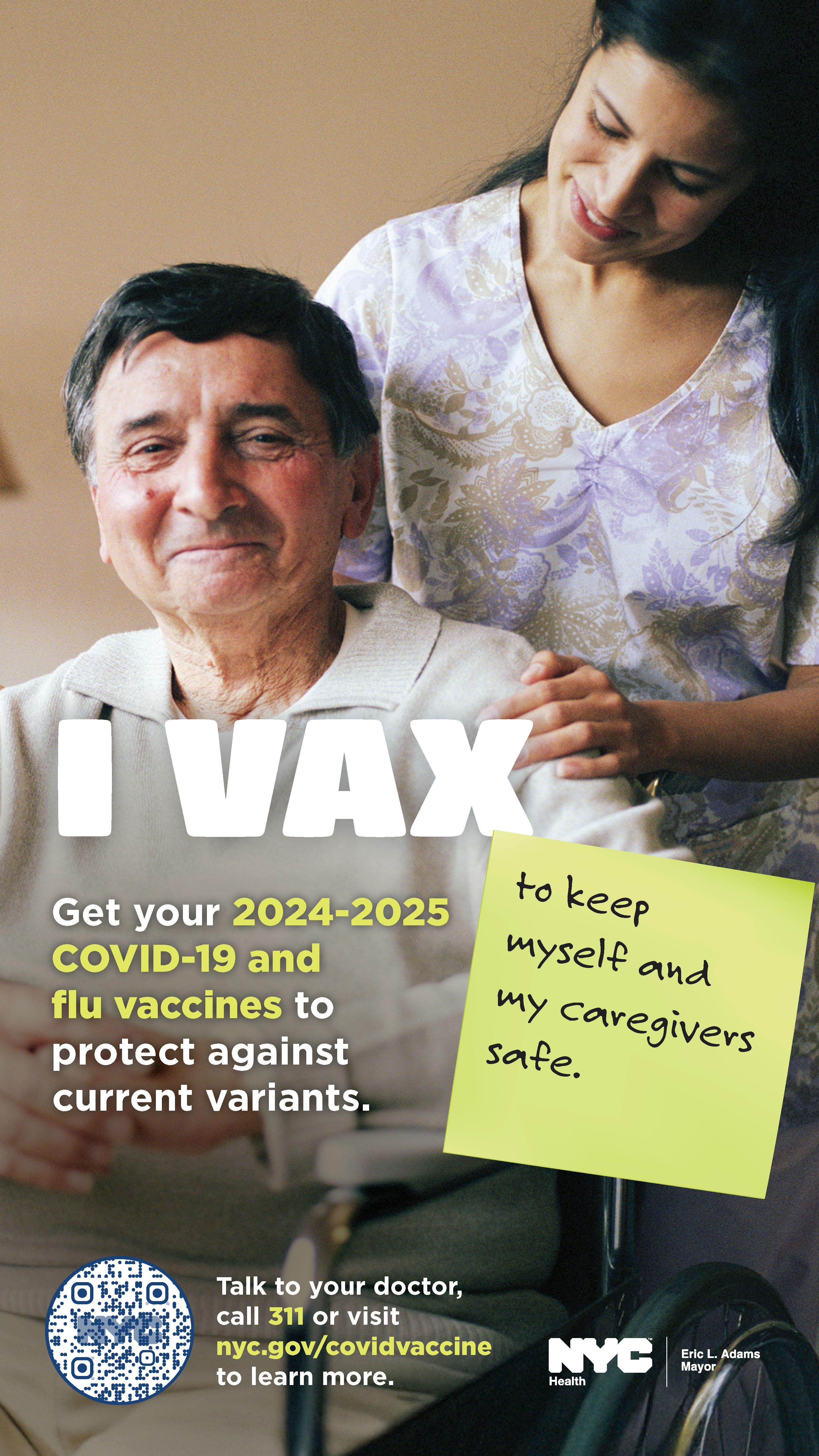Save Time, Stay Safe: Get the Flu and COVID Shots
All New Yorkers 6 Months of Age and Older Should Get Their Updated Flu and COVID-19 Vaccines for Maximum Protection Against Both Viruses This Season.
Older Adults and Pregnant People Should Also Get the RSV Vaccine If They Have Not Done So Before.
Talk To Your Healthcare Provider or Visit Vaccinefinder.nyc.gov to Find Sites Offering Flu and COVID-19 Vaccines. You Can Get Both Shots at the Same Time.
October 22, 2024 — The Health Department is urging New Yorkers to roll up (both of) their sleeves to protect themselves against the flu and COVID-19. Now is the time to get both shots.
The Health Department is launching a media campaign this month to encourage New Yorkers to stay safe. Promotional ads will run on digital, radio and outdoor media for at least six weeks beginning in mid-October.
All New Yorkers 6 months and older should get a flu and COVID-19 vaccine this fall.
Adults 75 and older, and those ages 65-75 with certain chronic conditions or other risk factors, should also get an RSV vaccine, if they have not done so before. To protect the youngest New Yorkers, people who are pregnant should get the RSV vaccine during pregnancy, or their newborn infant should get the RSV monoclonal antibody. Taking these steps will ensure our most vulnerable New Yorkers are protected against all three viruses.
“During fall and winter, New Yorkers are susceptible to more viruses than the flu,” said Interim Health Commissioner Dr. Michelle Morse. “The flu vaccine has protected the lives of New Yorkers for decades. But to keep yourself and your family safe, and save time, pair it with an updated life-saving COVID-19 vaccine.”
New Yorkers 50 and older, children 6 months to 5 years, those with certain chronic conditions and pregnant people are at particular risk of serious outcomes from the flu. Every year, about 2,000 New Yorkers die of seasonal flu and pneumonia, which can develop as a complication of the flu. Flu vaccine lowers the risk of hospitalization and death due to flu.
The 2024-2025 COVID-19 vaccines are designed to be more effective at protecting against the latest variants.
The Health Department is taking steps to promote the updated vaccines, launching a vaccination advertising campaign, engaging with providers, and activating community partnerships.
Check with your provider to see if they are offering vaccination. Vaccines are also offered by hundreds of providers around the city, including pharmacies. New Yorkers can find a flu and COVID-19 vaccine based on their insurance or at no cost near them by using the City’s Vaccine Finder. New Yorkers can find an RSV vaccine by visiting the NYC Health Map. All three vaccines can be given to adults at the same time. To assess your eligibility for enrollment in health insurance, call 311.
According to the Community Health Survey conducted in 2023, only 50% of people ages 18 years and older reported that they received a flu vaccine. The U.S. Healthy People 2030 goal for flu vaccine coverage is 70% for all ages. Additionally, there were inequities in vaccination by race/ethnicity. Compared to non-Latino white adults, adults who identify as non-Latino Black and Latino received flu vaccine at lower rates (54% vs 43% and 45% respectively). Asian adults had higher rates than white adults (60%). Access to health care, cost, and time are often barriers to access and contribute to these differences in vaccination rates.
Among adults aged 65 years and older, little difference was seen by race/ethnicity. Overall, 69% of older adults reported that they received the flu vaccine; coverage was 67%, 62%, 78%, and 69% in Latino, non-Latino Black, non-Latino Asian/Pacific Islander, and non-Latino white older adults, respectively.
Typical flu and RSV seasons start in the late fall and last throughout the winter and into the spring. Since flu activity can be unpredictable and flu viruses can be found year-round, most people are recommended to get the vaccine in September or October, though it is never too late to be vaccinated.
Older adults can be vaccinated against RSV year-round. However, pregnant persons should be vaccinated against RSV from September through January each year and newborns (whose pregnant parents are not vaccinated against RSV) can receive the RSV monoclonal antibody from October through March. COVID-19 vaccines can be administered year-round, though COVID-19 peaks have been seen in the winter, making the fall a good time to be vaccinated.
COVID-19, flu and RSV share many common symptoms, so it is important to get tested if you suspect you may have either illness as diagnosis can impact treatment.
###
#024-24
MEDIA CONTACT: Patrick Gallahue
PressOffice@health.nyc.gov





